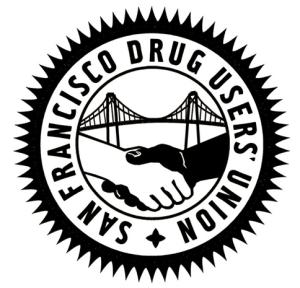Supervised injection sites for hard drug users are a proven public health and harm reduction intervention. Advocates and activists say the time is now to start opening them in the US.
Maryland is now the latest state to report a majority in favor of marijuana legalization, according to a new Goucher Poll.
Budweiser sponsors a medical marijuana campaign event in Arkansas, California localities continue to grapple with regulating the business, and there is action afoot in Utah. And that's not all.
A Newark, New Jersey, man is dead at the hands of drug police after they said he approached them with a loaded weapon (how did they know?), but angry neighbors had a different version of events.
A dirty cop in Philly costs convictions, two abusive Border Patrol agents get sent away, and we have a trifecta of crooked jail guards.
Portland's police chief demonstrates why local initiatives are only a start, a new Urban Institute report has ideas for reducing the federal prison population, the Irish parliament rejects marijuana legalization on its first go round, and more.
State level marijuana legalization activists look ahead, Colorado announces hemp farming rules, Denver backs away from a backyard pot-smoking ban, and strife continues in Mexico.
Utah is getting organized for marijuana law reform, the NAACP is supporting a "states' rights" federal marijuana bill, attention turns to the drug war south of the border in Washington, and more.
Marijuana and medical marijuana activism continues, a prescription drug monitoring bill moves in Pennsylvania, a West Virginia official jumps to conclusions on drug testing results, and Israelis are switching from hash to buds.
Uruguay appears poised to legalize marijuana Friday, the Afghan opium crop is at an all-time high, and the ACLU issues a report on people doing life without parole for nonviolent offenses. And there's more.
The only existing supervised injection site for hard drug users in North America is Vancouver's Insite, but panelists at a session of the International Drug Reform Conference in Denver last month said activists in a number of US cities are working to be next. (Plans are also afoot in a couple of Canadian cities.)

client at Vancouver's Insite supervised injection site (vch.ca)
Supervised injection sites (SIS) are
a proven public health and harm reduction intervention that can save lives by preventing overdoses, bring a measure of stability to the sometimes chaotic lives of addicts, reduce the spread of
bloodborne infectious diseases such as HIV/AIDS and Hepatitis C, and reduce crime and disorder in the community.
SISs also exist in a number of European countries and Australia, but face both legal and political hurdles in the US. Still, advocates are ready to push the envelope here in a bid to bring the life-, health-, and money-saving innovation here.
Donald Macpherson, executive \director of the Canadian Drug Policy Coalition and former head of Vancouver's Four Pillars drug policy program explained the prehistory of Insite, offering hints of possible courses of action in the US.
"We had a public health disaster," he said, referring to the city's escalating heroin problem in the 1990s. "Drug users themselves opened an SIS in 1995, and the police watched it, but didn't shut it down. A second opened in 2002. A year later, another non-sanctioned injection site opened up. It was really messy and it took years."
But in the end, Vancouver ended up with Insite and has managed to keep it open despite the best efforts of the Conservative federal government in Ottawa.
"Insite survives because it has an exemption from Canadian drug laws," Macpherson explained. "We won in the British Columbia courts, we won in the Canadian Supreme Court, which instructed the health minister to issue a permit. But we still barely have Insite, and though other cities are working on it, there is a big chill in Canada right now and we're just trying to hang on to what we've got."
Plans for SISs in the US face similar obstacles, but that isn't stopping advocates in a number of cities -- notably Austin, New York City, San Francisco, and Seattle, as well as somewhere in New Mexico -- from pressing forward with plans to open them there.
"I don't know if we'll be first, but we'll be one of many," said Robert Cordero, president and chief program officer of Boom! Health in the Bronx.
Boom! Health, which resulted from the merger of Bronx AIDS Services and Citiwide Harm Reduction, is a multi-service organization with a three-story building that includes a pharmacy, pharmacists with a harm reduction orientation, and a seven-day-a-week drop in center.
"Safe injection would be embedded with all these other services," he said.
"I don't know if we want to be first, but we want to be one of many," said Olivia Sloan, outreach and education associate for the Drug Policy Alliance (DPA) in New Mexico, which has been working patiently to bring cutting edge programs like SISs to the state. "We passed harm reduction, including needle exchange, through the state legislature, but it's not working," Sloan said. "We have overdose deaths at four or five times the national average."
Advocates in New Mexico have been and continue to lay the groundwork for SISs, Sloan said.
"We took a political and academic approach, and our conversation about injection facilities started a few years ago," she explained. "We have mobile syringe exchanges. We drafted legislation last year and the Senate passed a memorial to require we study the feasibility of SISs in New Mexico. We have partnered with the University of New Mexico and are looking for a principal investigator."
In San Francisco, preliminary discussions with local officials about
SISs have been going on for some time, but the
San Francisco Drug Users Union may follow the path taken by organized Vancouver drug users, as well as many of the needle exchange pioneers in the US, and just do it.
"We have a committee very committed to an SIS that meets every Monday for two hours," said Holly Bradford, the union's coordinator. "We're really on the verge. We have a very active bathroom here; you just open the door," she smiled. We're bringing it to San Francisco," she said. "It might not be sanctioned or aboveground, but it's going to happen."
Whether underground or not, SISs face a hazard-strewn trek. State, local, or federal officials can throw up any number of obstacles, said Lindsay LaSalle, a Berkeley-based law fellow for DPA.
"Drug possession remains illegal and could impact any SIS user, although probably not the staff or operator because they're not handling the drugs," she explained.
"Then there are the crack house laws, which both the federal government and some states have. They make it illegal for anyone to maintain, own, lease, or rent a property where drugs are used, consumed, or manufactured. These laws could cover SISs, and this could impact both clients and staff and operators alike," she elaborated.
"Then there are civil forfeiture statutes. They've used them to go after medical marijuana dispensaries," she enumerated.
Winning local official support reduces some risks, but not all, LaSalle said.
"If SISs were sanctioned at the local level, many of the legal risks dissipate, but state actors could still choose to prosecute," she warned. "In most states, local officers are deputized to enforce state law, so they could still go after an SIS. If authorized at the state level, that would be an incredible victory, but we would still have to deal with the federal government."
While acknowledging that lawyers can be "a buzzkill," LaSalle also hastened to add that things can change faster than we think.
"These legal barriers are not so different from the challenges we've faced with other drug policy issues, like syringe exchanges," she noted. "They were seen as completely radical, but now we have an almost universally accepted public health intervention with the exchanges."
Part of the process of initiating a supervised injection site is selling it to other stakeholders. Panelists had a number of ideas about messages that worked.
"For business people, you tell them this is how we clean up the neighborhood," said a Seattle activist.
"It is a very incremental change from syringe exchange to supervised injection sites," said LaSalle. "Position it as a very small change in an organization that provides all these other services to drug users."
"There's always 'what we're doing is not working,'" said Sloan.
"We're not going to arrest our way out of this problem," suggested Cordero. "But don't go straight to the SIS conversation. Let people see what we're doing, and then they say 'you're doing God's work' and second, 'Holy shit! Where would all those people be if you weren't open?'"
The obstacles to implementing supervised injection sites in the US are formidable, but the need to do so is urgent and increasingly understood, as are the benefits. With activists and advocates in a number of American locales pursuing SISs through a variety of means, the question is not whether it will happen here, but when and where.
back to top
The latest evidence that marijuana legalization has reached the tipping point comes from Maryland, where a new Goucher Poll has a slim majority for legalization, as well as strong support for decriminalization and overwhelming support for medical marijuana.
The poll found that 51% supported marijuana legalization, while 90% supported medical marijuana if prescribed by a doctor.
The poll also asked whether marijuana possessors should be jailed, subjected to drug treatment, or fined. A near majority (49%) supported fines (or decriminalization), while 34% supported drug treatment, and only 6% supported jailing pot people.
"When it comes to marijuana use in the state, a slight majority of Marylanders support legalization for small amounts, and a large majority support the drug's use for medicinal purposes," said Mileah Kromer, director of the Sarah T. Hughes Field Politics Center. "Citizens of the state also seem to support the decriminalization of marijuana, favoring policies that focus on rehabilitation and fines, rather than jail time for possession. This will be an issue to watch for the upcoming legislative session."
This year, the legislature approved a bill that authorized academic medical centers to distribute medical marijuana, but a decriminalization bill died in the House after passing the Senate.
The poll was conducted using both cell phones and land lines, with pollsters contacting 655 Maryland residents in late October. The margin of error is +/- 3.8%.
back to top
Budweiser sponsors a medical marijuana campaign event in Arkansas, California localities continue to grapple with regulating the business, and there is action afoot in Utah. And that's not all. Let's get to it:

MMJ leaf and stethoscope KY ODCP_106.jpg
Last Saturday, medical marijuana advocates kicked off a fundraising campaign to put an initiative on the 2014 ballot. Arkansans for Compassionate Care (ACC) is being joined by the national advocacy group Americans for Safe Access to push for the Arkansas Medical Cannabis Act. The campaign began with an all-day concert in El Dorado sponsored by Budweiser (!).
California
Last Wednesday, the Lodi city council extended its ban on growing medical marijuana. The council approved the moratorium last year after a woman complained about the odor from her neighbor's plants. Now, the council has extended the ban for another year. That will give the city time to study how best to deal with the issue, officials said. The ban cannot be extended again.
Last Friday, a Mendocino County judge granted a motion to suppress the evidence in a case where the driver's admission that he was a medical marijuana patient and had marijuana with him resulted in the search of his vehicle. The officer had no reason to believe the search would turn up evidence of a crime, so proper grounds hadn't been established for the search, the judge ruled. "This Court is not suggesting that the presentation of the 215 card was a means of immunization from the search," the judge wrote. "But, the totality of the circumstances included a voluntary statement coupled with the county issued card AND a complete absence of odor or impaired driving, or evidence of a larger amount of marijuana in the car." The ruling could become precedent for similar decisions statewide, since it is the first of its kind.
Also last Friday, a second former Vallejo dispensary operator sued the city for raiding his medical marijuana business. Matt Shotwell, the founder of Greenwell, Inc., alleges that the city violated his civil rights by targeting his dispensary for raids and closure because of his outspoken advocacy for medical marijuana. Another Vallejo dispensary, Homegrown Holistic Collective, Inc., sued the city on similar grounds last month. They are two of six dispensaries Vallejo police raided last year -- after voters approved a dispensary tax. All of those cases have fallen apart.
On Tuesday, the Alameda County board of supervisors adopted a resolution supporting marijuana legalization for both medical and recreational purposes and asking the Obama administration to "end federal interference" in states where it is legal. The resolution "respectfully requests that Obama begin a discussion about the potential benefits of reforming federal marijuana use in all forms, including medicinal and recreational uses," citing states such as Colorado and Washington that have approved recreational use of the drug.
Also on Tuesday, Butte County supervisors tightened the county's grow ordinance, but not as much as had been previously recommended. On a 4-1 vote, the board approved an amendment to the existing marijuana cultivation ordinance that would require growers to live in a legal residence on the land where their garden is located. The house must also have permitted water and a septic system. The change would also hike the civil penalties for violations of he code to $500 a day for the first offense and to $1,000 a day for the second offense. Proposals to halve the number of plants allowed and to make it easier for distant neighbors to complain were dropped.
Also on Tuesday, Humboldt County supervisors voted to extend the ban on new dispensaries in unincorporated areas of the county. The ban will remain until a new ordinance is drafted and approved.
Michigan
Last Tuesday, a medical marijuana bill won a Senate committee vote. The bill, which would allow "pharmaceutical grade" marijuana to be sold in pharmacies passed out of the Government Operations Committee on a 3-0 vote. Even if passed, the bill would require that marijuana be rescheduled under the federal Controlled Substances Act.
Nevada
Last Thursday, Carson City supervisors approved a six-month moratorium on dispensaries. The state legislature approved a dispensary bill earlier this year, but officials said they wanted the moratorium in place until state regulations are completed.
Utah
On Tuesday, three prominent Utah doctors came out in support of cannabis oil for kids with epilepsy. The low-THC, high-CBD oils "should be available as soon as possible to Utah children with severe epilepsy. The substance is not psychoactive or hallucinogenic, it contains less THC than do other materials that can be legally purchased in Utah, and it has absolutely no abuse potential," declared Francis Filloux, chief of the University of Utah Division of Pediatric Neurology, in a letter shared with Utah's Controlled Substances Advisory Committee. Two other university-affiliated doctors also signed the letter.
[For extensive information about the medical marijuana debate, presented in a neutral format, visit MedicalMarijuana.ProCon.org.]
back to top
Two undercover Essex County sheriff's deputies shot and killed a suspected drug dealer Wednesday, sparking an angry response from area residents. The dead man, so far identified only as "Jose," becomes the 35th person to die in US domestic drug law enforcement operations so far this year.
According to the
Newark Star-Ledger, citing Essex County Chief of Detectives Anthony Ambrose, the deputies were doing a drug investigation and approached "Jose" in a building on North 9
th Street. Ambrose said the man came out of the building with a loaded weapon, and both deputies opened fire, killing him.
Neighbors at the scene, who pelted the sheriff's office vehicle with rocks and debris, breaking at least one window, had a different version of events. Several of them told a Star-Ledger reporter that the deputies hit the man with their vehicle, then shot him as he lay on the ground. None of those interviewed would give their names, saying they feared retribution from the police.
"Why did you have to hit him with a car? Why'd you have to shoot him in the back?" people shouted over Ambrose as he spoke to reporters.
One neighbor who did identify himself, Jamar Smith, said he was a friend of the dead man and was on his way to his house when he heard the sound of a car crash followed by the loud bang of two gun shots. Smith and several others said one of the officers involved is well-known in the neighborhood for his aggressive policing and that they had had violent encounters with him, too.
back to top
A dirty cop in Philly costs convictions, two abusive Border Patrol agents get sent away, and we have a trifecta of crooked jail guards. Let's get to it:
In Philadelphia,
a state court judge threw out 53 convictions tainted by a corrupt cop last Friday. Common Pleas Supervising Court Judge Sheila Woods-Skipper threw out the convictions, which involved former Philadelphia police officer Jeffrey Walker, who was arrested by the FBI in May on charges he plotted with a government informant to rob drug dealers. In at least one incident, Walker stopped a suspect's vehicle, planted drugs, and then arrested the suspect. He and a confederate then stole $15,000 from the man's house. The city is also paying out massive settlements in lawsuits bought by Walker's victims, including many who served prison time after being framed in court, they claimed.
In Donaldsonville, Louisiana, an Elayne Hunt Correctional Center guard was arrested last Thursday on charges he was trying to smuggle drugs into the jail. Daron Toussant, Sr. was the object of an internal investigation at the jail, which led to a search of his home, which in turn led to the seizure of marijuana, synthetic cannabinoids, and a handgun. He is charged with possession with intent to distribute marijuana, possession with intent to distribute synthetic cannabinoid, illegal carrying of a weapon, and conspiracy to introduce contraband to a penal facility.
In Hollidaysburg, Pennsylvania, a Blair County Prison guard was arrested last Saturday after being caught bringing drugs to work. Fred Zigler, 27, went down after showing up with Oxycontin, Oxycodone, and acetaminophen tablets. He is charged with possession with intent to deliver and other drug charges.
In Charlotte, North Carolina, a Charlotte Correctional Institution guard was arrested Tuesday after investigators in an unrelated case saw him selling pain pills to another man. Brian Paul McAvoy, 28, was arrested at work, where he was found to be carrying a pain pill. He is charged with sale an delivery of a controlled substance, introduction of contraband into a correctional facility, and possession of drug paraphernalia.
In Tucson, Arizona, two former Border Patrol agents were sentenced Wednesday to serve two years each in federal prison for mistreating suspected marijuana smugglers. Former agents Dario Costillo, 25, and Ramon Zuniga, 31, went down for a 2008 incident in which they descended on a smugglers' encampment in the desert, but only managed to capture four of 20 smugglers. They forced the unlucky men to chew handfuls of marijuana and flee shoeless into the chilly desert. They were convicted of violating the four men's civil rights. Castillo was looking at up to 40 years and Zuniga, who was convicted of misdemeanors, was looking at up to four years.
back to top
Portland's police chief demonstrates why local initiatives are only a start, a new Urban Institute report has ideas for reducing the federal prison population, the Irish parliament rejects marijuana legalization on its first go round, and more. Let's get to it:
Marijuana PolicyPortland Police Chief to Ignore Legalization Initiative Victory. Portland, Maine, voterd Tuesday to legalize the possession of small amounts of marijuana, but Portland Police Chief Michael Sauschuck said his officers will continue to issue citations for pot possession under state law. But Sauschuck also said Portland police didn't consider small-time pot possession a high priority even before Tuesday's vote, and the numbers back him up. In the last two 12-month periods, police there have averaged about one pot possession ticket a week.
Medical Marijuana
Medical Marijuana Groups Launch Fundraising Campaign for 2014 Arkansas Initiative. Arkansas medical marijuana advocates Arkansans for Compassionate Care (ACC) have joined forces with the national advocacy group Americans for Safe Access to raise enough money to get the Arkansas Medical Cannabis Act initiative on the 2014 ballot. The campaign kicks off Saturday in El Dorado with a concert sponsored by Budweiser (!), which will give a portion of the proceeds to ACC.
Sentencing Reform
Urban Institute Report Says Best Way to Reduce Federal Prison Population is Modify Sentencing, Prosecution Policies. A new report from the Urban Institute, Stemming the Tide: Strategies to Reduce the Growth and Cut the Cost of the Federal Prison System, concludes that "reducing the number of drug offenders is the quickest way to yield an impact on both prison population and cost," and recommends changes in both prosecution ("front end") and sentencing and reentry ("back end") policies.
International
The Silk Road is Back. The anonymous online marketplace notorious as a drug-buying and -selling venue is back up and running. It went down earlier this year when FBI agents arrested its operator, Ross Ulbrict, but was up again as of yesterday.
David Nutt Calls Britain's Drug Laws an Obstacle to Research.Scientist David Nutt, the former head of the Advisory Commission on the Misuse of Drugs, says Britain's drug laws are stifling research into the benefits of drugs like marijuana and Ecstasy. "The UK has gone from being early adopters of evidence based harm reduction -- prescription heroin, needle exchanges and opiate substitute therapy -- to lagging behind many countries across the globe that are modifying their drug policies to better reflect advances in our understanding of drugs," he told Forbes. Nutt, who was fired from the commission over his views on drug policy, recently won the John Maddox Prize, which is awarded for courage in promoting science and evidence on a matter of public interest in the face of hostility.
Irish Parliament Rejects Marijuana Legalization. The Irish Dail (parliament) soundly rejected a bill to legalize marijuana Wednesday. The private member's motion filed by TD Luke "Ming" Flanagan was defeated on a vote of 111-8. Still, the occasion marked the first time the Dail has seriously debated marijuana policy.
Czech Activists Denounce Grow Shop Raids, Plan Protests. The Czech marijuana reform group Legalizace has denounced Monday's mass raids on grow shops as "an absolutely unacceptable and scandalous infringement upon civil rights and freedoms" and is calling for a protest Saturday evening at Prague's Old Town Square.
Iran Drug Executions Continue. The Islamic Republic of Iran is the world's leading executioner of drug offenders, and this month is no different. According to the anti-death penalty group Hands Off Cain, which monitors Iranian press reports, 11 people have been hung for drug offenses so far this month, and we haven't even finished the first week. The annual number of people executed for drug offenses in Iran is in the hundreds.
back to top
State level marijuana legalization activists look ahead, Colorado announces hemp farming rules, Denver backs away from a backyard pot-smoking ban, and strife continues in Mexico. Let's get to it:
Marijuana Policy
Kansas Activists Announce Marijuana Legalization Billboard Campaign. The Kansas activist group
Fire It Up Kansas has announced a billboard campaign to push for marijuana legalization. The first billboard is going up near the Kansas Star Casino in
Mulvane, with more coming shortly. The group made headlines recently when it was denied a chance to participate in the adopt-a-highway program. Kansas has some of the toughest pot laws in the nation, with second time possession punishable by up to 3 ½ years in prison and a $100,000 fine (!).
Massachusetts Activists Look to 2016 Marijuana Legalization Initiative. A group has formed to try to put marijuana legalization on the 2016 Massachusetts ballot. Bay State Repeal, composed of veteran activists, said it had filed paperwork this week to get the process rolling. The group will test-drive different versions of legalization with non-binding referendum questions next year in selected House and Senate districts, a strategy that has worked well for Bay State activists for more than the last decade.
Maine Marijuana Legalization Advocates Eyeing 2014, 2016. In the wake of the successful personal marijuana legalization initiative in Portland, Maine's largest city, advocates are aiming for legalization statewide, either through the legislative process next year, or, if the legislature balks, through the initiative process in 2016.
Columbia, Missouri, Councilwoman Wants Reduced Penalties for Marijuana Grows. Columbia Councilwoman Barbara Hoppe has asked city staff to draft an ordinance reducing penalties for those caught growing small numbers of pot plants for personal use. Under the ordinance, people caught growing six or fewer plants would face a misdemeanor charge with a maximum $250 penalty. State law considers any marijuana cultivation a felony. Hoppe acted after a proposal from Missouri Civil Liberties Union head Dan Viets, a long-time drug policy reformer and Benton Berigan, head of the University of Missouri NORML chapter.
No Backyard Pot Smoking Ban in Denver. The Denver City Council has scrapped its misbegotten effort to ban backyard pot smoking. Instead, the latest draft ordinance only bans smoking on the front porches of private property visible to the public. The latest proposal also decreases criminal penalties for the display and sale of marijuana in public parks to a $100 fine and 24 hours of community service.
Medical Marijuana
Michigan Medical Marijuana Bill Moving. A bill that would allow "pharmaceutical grade" marijuana to be sold in dispensaries advanced this week, passing the Senate Government Operations Committee on a 3-0 vote. The measure, Senate Bill 660, seeks "to provide for the licensure and regulation of facilities to grow and test pharmaceutical-grade pot, and allow those facilities to sell the drug to pharmacies to dispense." Patients who registered under the bill could acquire two ounces of pharmacy medical marijuana each month, but would lose the ability to grow their own.
Industrial Hemp
Colorado Announces Hemp Production Rules. The Colorado Department of Agriculture Wednesday announced proposed rules for industrial hemp production, which was legalized in the state last year by Amendment 64. Under the proposed rules, farmers would pay annual fees of at least $200 and submit to inspections to ensure they're growing hemp, not marijuana. Hemp production remains illegal under federal law, but at least one Colorado farmer has already grown and harvested a crop without federal government interference.
International
Mexican "Self Defense" Groups Agree to Back Off Front Confrontations with Drug Cartel. Earlier this week, leaders of two "self defense" groups in Michoacan state said they would pull back from confrontations with the Knights Templar drug trafficking organization after the Mexican government promised to crack down on the cartel. The groups had marched in the cartel stronghold of Apatzingan late last month, sparking confrontations that left at least five people dead and hundreds of thousands without electricity. Since then, the federal government has sent troops into the key Michoacan port of Lazaro Cardenas, and vigilante leaders are waiting for the government to do the same in Apatzingan.
back to top
Utah is getting organized for marijuana law reform, the NAACP is supporting a "states' rights" federal marijuana bill, attention turns to the drug war south of the border in Washington, and more. Let's get to it:
Marijuana PolicyNAACP Endorses Federal Respect States Marijuana Laws Act. The NAACP late last month formally endorsed the Respect States Marijuana Laws Act, House Resolution 1523. Introduced in April by Rep. Dana Rohrabacher (R-CA), the measure would protect both medical and recreational marijuana use and distribution in states where it is legal. That the nation's largest African-American organization and one of the top civil rights organizations would support a "states' rights" measure, given the history with which states' rights is weighted when it comes to race relations, suggests that the NAACP fully understands how destructive the war on marijuana has been to African-American communities.
Beehive State Activists Form Utah Cannabis Coalition. A number of Utah-based marijuana reform groups have formed the Utah Cannabis Coalition to fight for marijuana legalization in all its forms. The groups include Hempower Utah, SLC Hemp, Utah Moms for Marijuana, Salt Lake City Moms for Marijuana, Legalize Utah, and UtahCARE - Cannabis Awareness, Respect and Education. The coalition will be working to win over legislators and holding a number of event this fall and winter.
Search and Seizure
Another New Mexico Nightmare Drug Search, This One Courtesy of the Feds. The New Mexico chapter of the ACLU is representing a woman who was subjected to a strip search, vaginal and anal probes, X-rays, and a CAT-scan, as well as being forced to defecate in front of observers after a drug dog alerted on her as she crossed the US-Mexico border. No drugs were found. This incident comes after two recent cases of Deming police subjecting unwitting motorists to similar treatment, but in this case, the abuse took place at the hands of federal officials and compliant medical personnel.
International
Prague Grow Shop Raids Spark Protest. The Czech marijuana activist groups Leglizace organized a protest in central Prague Saturday against recent mass police raids on shops that sell indoor gardening equipment often used to grow marijuana. Some 200 people gathered to whistle loudly as they carried signs with messages such as "Growing is No Crime." Police have charged at least 22 people with criminal offenses in the wake of the raids.
Mexican Drug War
Petition to End US Support for Mexican and Central American Drug Wars. A petition sponsored by the Americas Program of the Center for International Policy is calling on Congress and the Obama administration to carry out a "fact-based evaluation and seriously rethink the war on drugs" as applied to Mexico and Central America. "We call on you to end funding to the bloody war on drugs in Mexico and Central America, which has led to the death and disappearance of more than 100,000 Mexicans and the dangerous militarization of the region. Instead of continuing to waste billions of taxpayer dollars through the Merida Initiative and the Central American Regional Security Initiative, we urge you to join citizens and governments of the region in the search for more just, effective and humane alternatives to the drug war at home and abroad," the petition says. You can sign it at the link above, and it could use your help; the goal is 5,000 signatures this week, but it so far has fewer than 500.
Javier Sicilia and Caravan for Peace in Washington, DC, This Week. Mexican poet and drug peace leader Javier Sicilia and the Caravan for Peace (Movement for Peace with Justice and Dignity) will be in Washington Tuesday and Wednesday. Sicilia and the group will brief the Organization of American States and Congress at separate events Tuesday and Wednesday. Click on the link for more details.
back to top
Marijuana and medical marijuana activism continues, a prescription drug monitoring bill moves in Pennsylvania, a West Virginia official jumps to conclusions on drug testing results, and Israelis are switching from hash to buds. Let's get to it:
Marijuana PolicyMissouri Statewide Conference on Marijuana Law Reform This Saturday. Show-Me Cannabis and Missouri NORML will be hosting a statewide conference in downtown Kansas City, on Saturday, November 16th. The one-day conference will include speakers presenting on local and national efforts to create more just and sensible marijuana policies, including a possible Missouri ballot initiative in 2014 or 2016. There is a nominal entry fee; see the link for more details.
Medical Marijuana
Duluth Medical Marijuana Forum Draws Big Crowd. More than 200 people showed up for a public forum on medical marijuana at the University of Minnesota-Duluth Monday night. The forum focused on a medical marijuana bill introduced this spring by Rep. Carly Melin (DFL-Hibbing). That bill is not expected to pass this year, but activists are laying the groundwork for next year.
Drug Testing
West Virginia Work Training Drug Test Program Finds Few Dopers. In July 2012, Gov. Earl Ray Tomblin (D) issued an executive order requiring participants in the state's federally-funded job training program to pass drug tests. In the past 15 months, 1750 people were tested, but only 20 failed the screening. State Commerce Secretary Keith Burdette, hailed the results as a success, claiming "Folks that can't pass a drug test don't try." Nice spin, but he hasn't been able to back it up with any numbers about people applying for the program, then walking out after being informed of the drug test.
Prescription Drugs
Pennsylvania Prescription Drug Monitoring Bill Passes House. A bill to create a statewide prescription drug monitoring system to track the use of commonly abused prescription medications has passed the Pennsylvania House. The legislation aims to replace the attorney general's existing database, which tracks a more narrow category of prescription drugs and does not make any information collected accessible to doctors and pharmacists.The new database would include federal schedule II through V drugs, and aims to aid doctors, pharmacists and law enforcement uncover so-called "doctor shopping." [Ed: But will it end up keeping medicine away from more pain patients, absent other reforms? - DB]
International
Israelis Switch from Hash to Weed. The balloon effect is always at work. Because of security fears, Israel fenced itself off from the West Bank and increased vigilance on the borders. As a result, hash from neighboring countries has become more difficult to smuggle into Israel, and as a result of that, Israelis are now growing their own marijuana and smoking buds instead of hash, according to this Business Week report.
back to top
Uruguay appears poised to legalize marijuana Friday, the Afghan opium crop is at an all-time high, and the ACLU issues a report on people doing life without parole for nonviolent offenses. And there's more. Let's get to it:

Dicky Lee Jackson sold meth to pay for medical treatment for his son. He may never come home. (aclu.org)
Denver Marijuana-Smoking Rules Would Allow Toking Anywhere on One's Property. The Denver city council Tuesday gave preliminary approval to rules for marijuana consumption that would allow residents to smoke anywhere on their own property, even front yards. Earlier versions of the rules had attempted to impose stricter limits, but were beaten back. The rules would ban "display" or distribution of marijuana on the 16th Street Mall and in city parks. Violators would be hit with fines, not criminal offenses.
Up to an Ounce of Pot Now Legal in Jackson, Michigan. That didn't take long. Voters last week approved a local initiative to legalize the possession of up to an ounce, and on Tuesday, the city council unanimously amended city ordinances to comply. The change goes into effect immediately, but marijuana possession remains illegal under state law, and it isn't clear yet what local law enforcement is going to do.
Drug Overdoses
New Study on US Drug Overdose Deaths. A new study published in the American Journal of Preventive Medicine examines drug poisoning mortality on a county by county basis. Drug poisoning is now the leading cause of accidental death in the US and has increased threefold in the last three decades. The rise in drug poisoning deaths is correlated with an increase in the non-medical use of prescription drugs, especially opioids. There is a wealth of data in this study.
Sentencing
More Than 3,000 Doing Life in Prison for Nonviolent Offenses. Some 3,278 people in the US are serving sentences of life without parole for nonviolent offenses, and 79% of them are for drug offenses, according to a new report from the American Civil Liberties Union. Two-thirds of them are black. "The punishments these people received are grotesquely out of proportion to the crimes they committed," said Jennifer Turner, ACLU Human Rights Researcher and author of the report. "In a humane society, we can hold people accountable for drug and property crimes without throwing away the key."
Congressional Drug Warriors Want Stiffer Penalties for "Candy-Flavored" Drugs. Senators Diane Feinstein (D-CA) and Chuck Grassley (R-IA) Wednesday introduced the Saving Kids from Dangerous Drugs Act of 2013 (not yet available online). The bill would increase penalties for "drug dealers who entice children with candy-flavored methamphetamine, cocaine, or other dangerous drugs." Although the announcement emphasizes hard drugs, it also references medical marijuana products "with child-friendly names like Pot Tarts and Reese's Crumbled Hash Brownies."
Supreme Court Hears Two Drug-Related Sentencing Cases. The US Supreme Court Tuesday heard two cases where drug defendants are appealing lengthy prison sentences. In one case, the defendant was sentenced to 20 years in prison after selling heroin that resulted in the death of a drug user; in the other case, the defendant was sentenced to 10 years in prison for an "aiding and abetting" firearms offense during a drug deal gone bad. In both cases, the defendants argued that the sentences were not supported by the facts of the case. The cases are Burrage v. United States, U.S. Supreme Court, No. 12-7515 and Rosemond v. United States, 12-895, respectively.
International
Uruguay Senate to Vote on Marijuana Legalization Friday. Uruguay is poised to become the first country on the planet to legalize marijuana commerce with a Senate vote set for Friday. The lower chamber approved it earlier this year. Given that Uruguay has a parliamentary system and the measure has the support of the president and the governing party, it should be a done deal, but we'll check back in on Friday. (The link is Spanish-only. Lo siento.)
Afghan Opium Production at Record Levels, UN Says. Afghanistan produced a record 6,060 tons of opium this year, an all-time high, the UN Office on Drugs and Crime reported Wednesday. That's up 49% over last year and means that Afghanistan accounts for around 90% of the total global illicit opium supply. The withdrawal of NATO and US forces next year means no improvement is likely in the near future, the UN said.
South Africa Drug Treatment Groups Say Legalize Some Drugs. South Africa's Anti-Drug Alliance, a professional drug treatment group, is calling on the government to legalize some drugs and focus on treatment and prevention instead of emphasizing drug busts and related arrests. In a report last week, the group said government anti-drug spending, with its heavy emphasis on policing, was ineffective.
back to top










